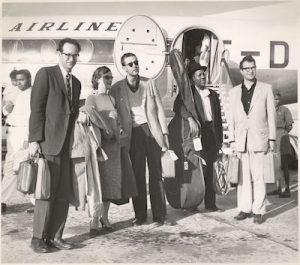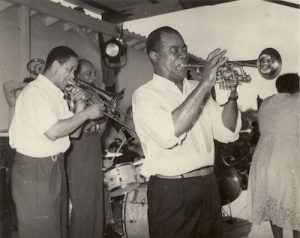Communiqué
Cold War Story of Music, Diplomacy and Civil Rights – “The Jazz Ambassadors” – February 2 at 9 pm
< < Back to the-jazz-ambassadors-premieres-friday-may-4The Jazz Ambassadors
Tuesday, February 2 at 9 p.m.
The Cold War and Civil Rights movement collide in this remarkable story of music, diplomacy and race
In 1955, as the Soviet Union’s pervasive propaganda about the U.S. and American racism spread globally, African-American Congressman Adam Clayton Powell, Jr. convinced President Eisenhower that jazz was the best way to intervene in the Cold War cultural conflict. For the next decade, America’s most influential jazz artists, including Dizzy Gillespie, Louis Armstrong, Duke Ellington, Benny Goodman and Dave Brubeck, along with their racially-integrated bands, traveled the globe to perform as cultural ambassadors.

But the unrest back home forced them to face a painful moral dilemma: how could they promote the image of a tolerant America abroad when the country still practiced Jim Crow segregation and racial equality remained an unrealized dream?
Told through striking archival film footage, photos and radio clips, with iconic performances throughout, the documentary reveals how the U.S. State Department unwittingly gave the burgeoning Civil Rights movement a major voice on the world stage just when it needed one most. Leslie Odom, Jr., narrates.
Featuring:
• Quincy Jones, Musician and Arranger
• Charlie Persip, Drummer, 1965 Dizzy Gillespie Tour
• Adam Clayton Powell, III, Son of Adam Clayton Powell, Jr.
• Darius Brubeck, Jazz Musician
• Bill Crow, Bass Player, Benny Goodman USSR Tour
• Leslie Odom, Jr., film narrator
• Hugo Berkeley, Peabody Award-winning director (Land Rush, A Normal Life)
• Mick Csáky, producer (producer & director of Sister Rosetta Tharpe: The Godmother of Rock & Roll for American Masters)

Noteworthy Facts:
• Spurred by presenter Willis Conover’s hugely-popular Voice of America radio show, audiences worldwide develop a passion for American jazz.
• When Louis Armstrong plays before more than 100,000 people in West Africa, U.S. diplomats take note, thinking that jazz could give America an edge in the Cold War.
• In January 1956, trumpeter Dizzy Gillespie kicks off his tour of the Middle East and Turkey to help counter Soviet stories about American racism.
• Over the next 10 years, more than 20 tours featuring renowned jazz musicians visit over 100 countries, giving Civil Rights an international platform even while the performers themselves questioned representing a nation still roiling with segregation and intolerance.
• Benny Goodman and his mixed-race band’s 1962 tour of the Soviet Union was the first time that the Russians permitted a foreign jazz band to tour the region.
• The U.S. State Department scaled back the Jazz Ambassadors program when Duke Ellington’s tour of the Middle East and India was tragically cut short by JFK’s assassination.

